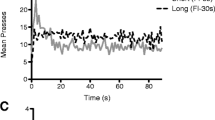Abstract
2 experiments were conducted to assess the reinforcing properties of space. Key pecks were reinforced on several FR schedules of reinforcement by access to a large space from a smaller one. Experiment 1 demonstrated that the bird spent more time in the food box before responding to meet the FR requirement as the FR requirement for access to space increased. Experiment 2 demonstrated that the results of Experiment I were not a function of social reinforcement or changes in the behavior as a result of time in the experiment. The results were interpreted as demonstrating that access to space can act as an effective reinforcer.
Similar content being viewed by others
References
FERSTER, C. B. 1964. Arithmetic behavior in chimpanzees Scientific American, 210, 98–106.
FERSTER, C. B., HAMMER, C., & RANDOLPH, J. 1968. An experimental space combining individual and social performances Journal of the Experimental Analysis of Behavior, 11, 209–220.
FERSTER, C. B., & SKINNER, B. F. 1957. Schedules of reinforcement. New York: Appleton-Century-Crofts.
FINDLEY, J. D. 1962. An experimental outline for building and exploring multioperant behavior repertoires Journal of the Experimental Analysis of Behavior, 5, 113–166.
FINDLEY, J. D. 1966. Programmed environments for the experimental analysis of human behavior. In W. K. Honig (Ed.) Operant Behavior: Areas of Research and Application. New York: Appleton-Century-Crofts. Pp. 827–848.
HARLOW, H. F., HARLOW, M. K., & MEYER, D. R. 1950. Learning motivated by a manipulation drive Journal of Experimental Psychology, 40, 228–234.
LORENZ, K. C. 1966. On aggression. New York: Harcourt, Brace & World.
MONTGOMERY, K. C. 1954. The role of exploratory drive in learning Journal of Comparative and Physiological Psychology, 47, 60–64.
Author information
Authors and Affiliations
Additional information
The authors thank Mary Jagodzinski for her assistance during the course of the experiment. This research was supported by Grant No. NGR 09-003-015 from the National Aeronautics and Space Agency to the second author.
Rights and permissions
About this article
Cite this article
Creed, T.L., Ferster, C.B. Space as a Reinforcer in a Continuous Free-Operant Environment. Psychol Rec 22, 161–167 (1972). https://doi.org/10.1007/BF03394076
Published:
Issue Date:
DOI: https://doi.org/10.1007/BF03394076




